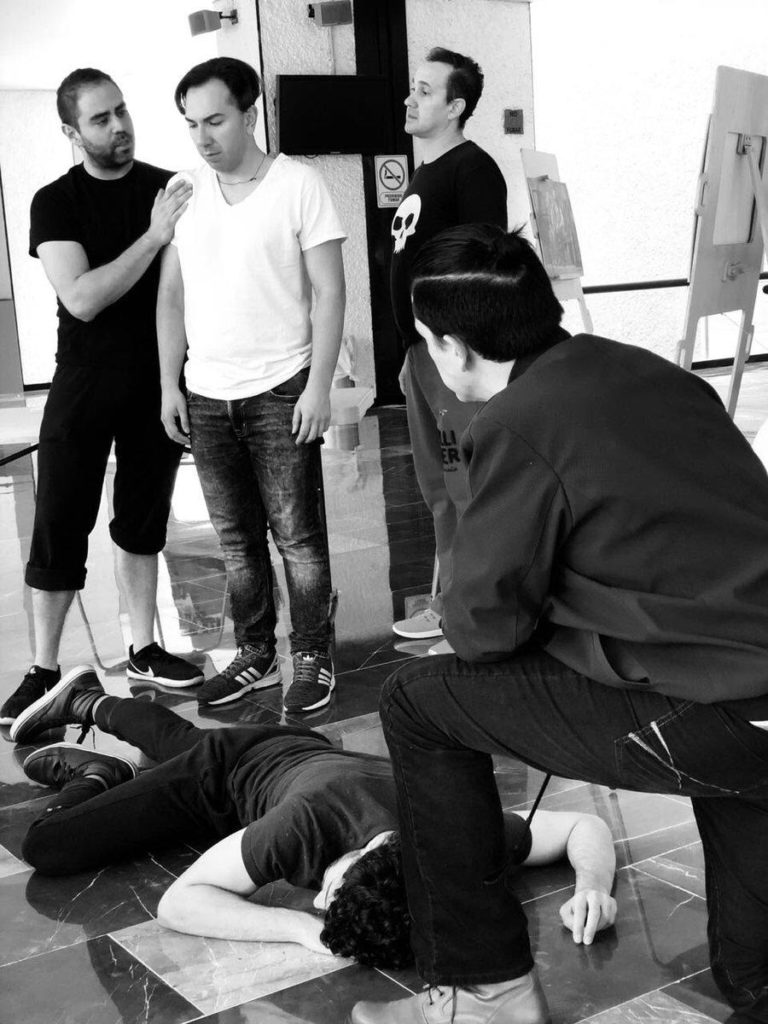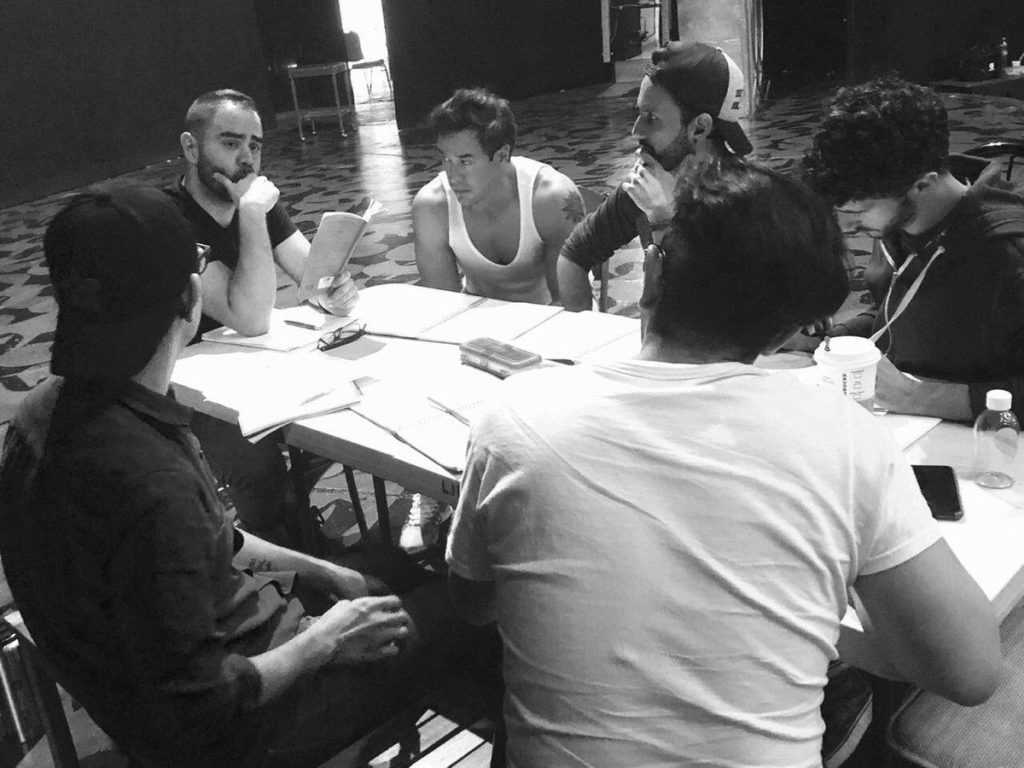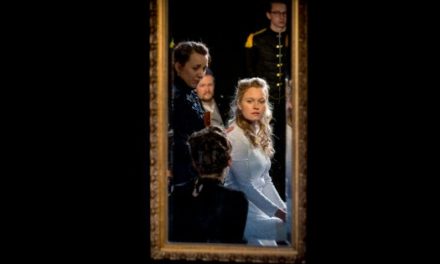Kiss Of The Spider Woman is splendidly directed by Miguel Septién, an excellent director who manages the space-scene-actor in an exceptional way, enhancing his aesthetic in this excellent staging where he splendidly represents the abstract and the symbolic, between the gray and oppressive prison atmosphere and the technicolor glamor of the staged films. It presents us with a reflection on the roles imposed by society, which mean another way of being a prisoner.
After having settled in Boston, where he studied acting and directing at Emerson College, Miguel Septién returned to Querétaro where he was Resident Director of the Theater Area at the Instituto Tencnológico de Monterrey Campus Querétaro and he also founded Icaro Compañía Teatral, where he has directed several plays, with different creative characteristics that show his wide capacity.
Urinetown was a turning point in Miguel’s career, after a successful season in Querétaro, it was performed in Mexico City at Teatro Hidalgo and at Teatro Milán and received four Awards from the Association of Critics and Journalists of Theater ACPT, among which is the Best Musical of 2017.
Juan Torres invited Miguel Septién to direct Kiss Of The Spider Woman, in Mexico where he is consecrated as a new talent in the direction of musical theater in Mexico, since it gives exceptional expression to Puig’s fictional creations, achieving that the actors put their voice and body at the service of the text.
Miguel manages to translate the essence of the work on stage, achieving an environment in which the characters act in perceptible realities of form, light, and color. In addition, he can see in the text all that is not evident to the spectators, managing to synthesize and translate the meanings into master lines, resulting in the creation of an out-of-series Aurora and great performances by the entire cast.
He is a director who has knowledge, experience, sensitivity, intuition and great power of imagination which is reflected in this staging, as it allows both actors and spectators to imagine together, transform and immerse ourselves in a world of emotions in which Miguel manages to communicate the performative metaphors of this work creating a sensationally potent and theatrically vital show.
Icaro Compañía Teatral has employed more than 200 actors, musicians, designers, technicians, and staff and has participated in more than 50 plays, in different facets, always renewing in front of the conventions of its time and marking a new era in the staged in Querétaro.
In the beginning, they performed in alternative spaces such as the one of a troje abandoned in the Ex Hacienda Los Laureles, the Patio de las Novicias del Ex Convento de Santa Rosa de Viterbo. Icaro is the first company that completed a season in the Experimental Forum and at the Metropolitan Theater. And in 2015, they inaugurated their own space: “Laberinto.”
The Pillowman, Marat Sade, Musical Night, Dream Of A Summer Night, The Birds Conference, I Am Not What I Am, Broadway Unplugged, Broadway A La Carte, When We Lived Together In The Belly Of A Whale; Some Nights Were Perfect, Spring Awakening: The Broadway Musical, Spring Awakening: A Childhood Tragedy, Julius Caesar, Jack, Urinetown The Broadway Musical, which made him famous in Mexico City.

Production Kiss Of The Spider Woman.
Kiss Of The Spider Woman
Kiss Of The Spider Woman with music by John Kander and Fred Ebb, book by Terrence McNally. Based on the novel by Manuel Puig, El Beso De La Mujer Araña. The musical ran in the West End (1992) and Broadway (1993) and won the 1993 Tony Award for Best Musical.
Kiss Of The Spider Woman premiered in the West End at the Shaftesbury Theatre on October 20, 1992, where it ran for 390 performances. Directed by Harold Prince with choreography by Vincent Paterson. The production won the Evening Standard Award for Best Musical.
It opened on Broadway at the Broadhurst Theatre on May 3, 1993, and closed on July 1, 1995, after 904 performances. It was again directed by Harold Prince, choreographed by Vincent Paterson and Rob Marshall, scenic design and projection design by Jerome Sirlin, costume design by Florence Klotz, and lighting design by Howell Binkley. The cast included Brent Carver, Anthony Crivello and Chita Rivera repeating their roles, as well as Merle Louise and Kirsti Carnahan. Carver, Crivello, and Rivera won Tony Awards for their performances.
This musical has been presented in the main capitals of the world and has been performed by the most important actors of each country. However, Kiss Of The Spider Woman has been characterized because its female protagonist, performs a star of the scenarios. This is how the names of Chita Rivera, Vanessa Williams, Maria Conchita Alonso, Valeria Lynch, Christian Bach, among others, have played Aurora/Mujer Araña adorning the marquees of the world’s main theater capitals.
The company has 21 actors on stage, led by Chantal Andere who shares the stage with Luis Gatica, Olivia Bucio, Rogelio Suárez, and Jorge Gallegos. With an orchestra of 10 musicians directed of Eduardo Soto.
The play is splendidly directed by Miguel Septién, a young Queretaro talent, whom the Mexican press has cataloged as “The Golden Boy of the Musicals,” he also directed and produced the musical Urinetown, which was a multi-award-winning production in 2017.
Production Stage Manager Juan Torres and Chantal Andere who leads the cast. Scenic Design by Oscar Acosta, who also designed the scenery of La Jaula De Las Locas, Papi Leñas Largas, and La Fierecilla Tomada; Choreographed by Pablo Rodríguez; Aurora and the Spider Woman´s Costume Design, Eugenio Alzas and the Makeup Artist is Bernardo Vázquez, (La Jaula de las Locas).
Septien’s direction manages to overcome the musical’s shortcomings with a stunning performance and a cast of sterling vocalists. The play is performing in Mexico City, at Hidalgo Theater.

Production Kiss Of The Spider Woman.
Manuel Puig
Manuel Puig’s novel about a South American gay window dresser named Molina, imprisoned for corrupting a minor, he shares a cell with Valentin, a revolutionary in the military government in Argentina.
The story broke outside the confines of a tiny prison cell and into a lush, technicolor musical with dark undertones. Chantal Andere plays the imposing, exotic title character, an angel of death who loomed over the proceedings with a majesty seldom witnessed on the musical stage.
Puig takes to the extreme the convention of the unity of place by reducing the space of this work to the narrow and closed limits of the cell where they confront the dogmatic, materialistic and puritanical vision of the Latin American Marxists who failed in all their revolutions against the vindication of fantasy, sentimentality and petty-bourgeois illusions.
Both are in a complex relationship whose poetic background is fueled by film and fantasy and makes them explore the limits of social roles and conventions. Aurora, is a character added to the imagination of Molina, who grew up very close to the world of cinema and the great divas of the middle of the last century.
Manuel Puig uses a superimposition of temporal planes, mimetic time (the present “real” of the characters’ lives) is superimposed on a triple diegetic time: the past of the memories evoked by them, the fantastic present recreated in his fictions and hallucinations, and the future with which they dream which acquires a special dimension.
Manuel Puig’s novel Kiss Of The Spider Woman was published in 1976 in Argentina and was censored during the last military dictatorship. Its power and impact in its time (even nowadays) are palpable if we start from understanding art, and literature, not as a mirror that reflects social reality but as a space to produce senses, which shows those values or meanings that are emerging at a given historical moment and create ruptures in the dominant social order.
The originality of Manuel Puig’s work marked a chapter in the Hispano-American narrative and gave him international recognition.

Production Kiss Of The Spider Woman.
This post was written by the author in their personal capacity.The opinions expressed in this article are the author’s own and do not reflect the view of The Theatre Times, their staff or collaborators.
This post was written by Lorena Meeser.
The views expressed here belong to the author and do not necessarily reflect our views and opinions.


















